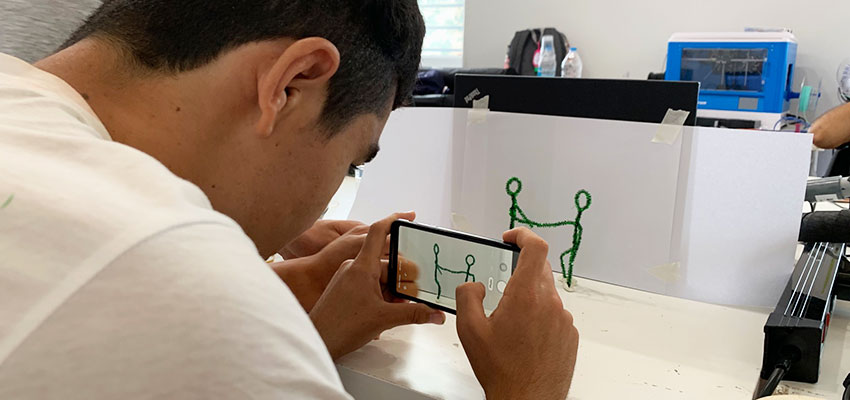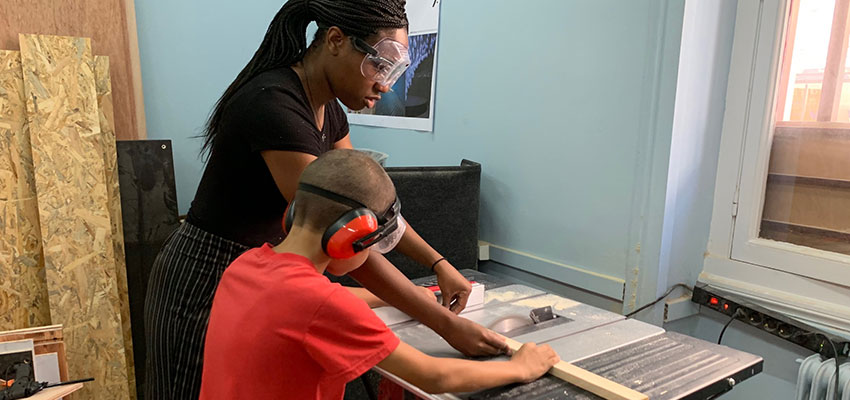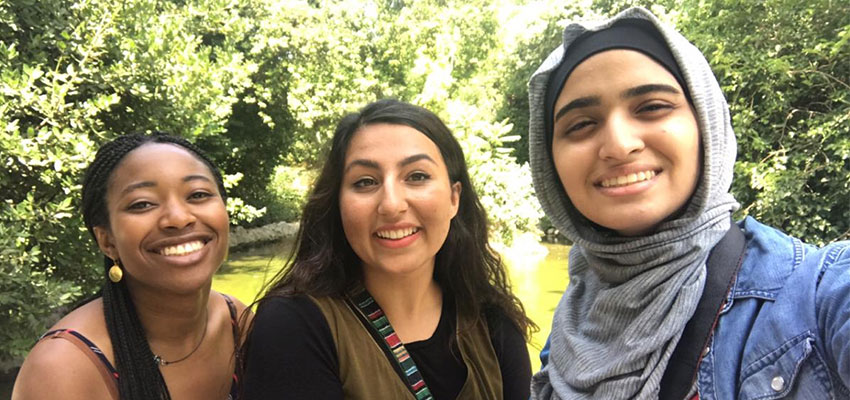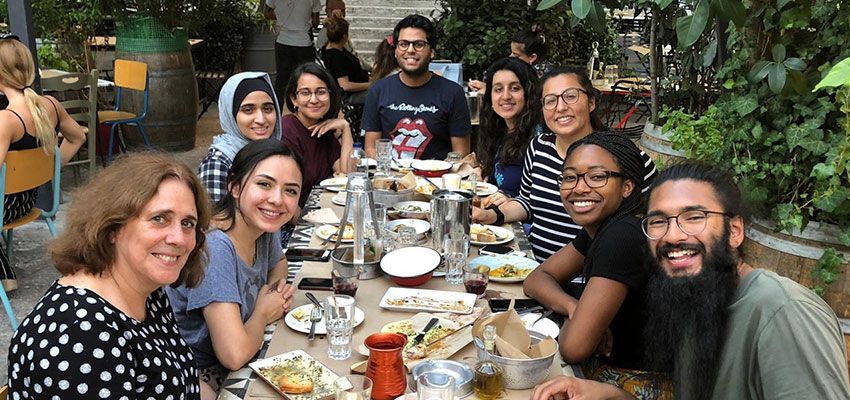
In 2015, there was a huge influx of Syrian refugees passing through Greece from Turkey with hopes of continuing on and seeking asylum in Western European countries that had opened their borders to refugees. Refugees from Iraq, Afghanistan, and Iran also began crossing into Greece with the same goal in mind. In 2016, the European Union and Turkey made a deal that effectively closed their borders, which stranded 60,000 refugees in Greece. Of that 60,000, about 3,800 were unaccompanied minors.
For three weeks this summer, a team of students from MIT and Harvard traveled to Greece with MIT D-Lab to teach students at the Faros Horizon Center in Athens. Faros is a Greek NGO and the Horizon Center has a design curriculum that integrates technical skills (like woodworking, tailoring, and electronics) and the creativity essential to design (for example, by sketch modeling and painting) to a group of unaccompanied minor refugee boys from countries including Afghanistan, Pakistan, Syria, Iran, Bangladesh, and Somalia. Joining me on this trip were Humanitarian Innovation Specialist Martha Thompson; MIT IDM graduate Susana Tort; Harvard graduates Ivraj Seerha and Sai Rajagopal; MIT graduates Faran Haider and Alexandra Shade; MIT undergrads Sally Beiruti, Dana Dabbousi, Mariam Dogar, and Tooba Shahid; and Harvard undergrad Shruthi Venkata.

The boys who come to the Horizon Center range in age from 11 to 18 years. They may have ended up in their current situation because their parents had sent them ahead to try and get into Europe, their parents had to leave them behind as they progressed further into Europe, they might have gotten separated some other way along the way, or their parents might have died or been detained. Unaccompanied minors are an extremely vulnerable population, at risk for drug trade involvement and sexual exploitation. They are housed in shelters, hotels, and detention centers, but also live on the streets, and the average wait for accommodation in a shelter is about five months.
This trip was the culmination of many, many moments for me. I am the daughter of two Afghan refugees and I feel as though I have been on a journey to this point for a long time. Ever since I first traveled to Afghanistan in fifth grade and I met my cousins, some of whom were girls my age and could not — still cannot — read or write, and I saw the stark contrast between our lives, made especially pronounced once I got into MIT and even on this trip, where I was able to take the role of volunteer instead of refugee, I have known that I wanted to be doing something for my people.

"Ever since I first traveled to Afghanistan in fifth grade and I met my cousins, some of whom were girls my age and could not — still cannot — read or write, and I saw the stark contrast between our lives, made especially pronounced once I got into MIT and even on this trip, where I was able to take the role of volunteer instead of refugee, I have known that I wanted to be doing something for my people."
Some of the boys referred to me as hamshehri, a Farsi word I was not familiar with. They explained to me that it meant we are of one land, the literal meaning “fellow countryman.” These boys looked like my family, spoke like my friends, laughed like my brothers. They are some of the kindest teenage boys I have ever met. They are honest about the things they love and they affirm one another. Seeing them grow over the course of a week or two has been one of the greatest things I have ever been a part of. On the last Friday before we left, as we were all cleaning up and preparing for goodbyes, a video was playing in the Horizon Center lobby (made by some of the boys the previous week!). The video had someone soldering a wire. It was playing in the background but one of the boys was watching intently and he said, almost to himself, “I can do that now.” Then he turned to one of his friends and said, “You can do that now!” and gave him a clap on the back. The Horizon Center gives them skills and access to materials and technology, but the most important thing it gives them is this confidence and a return to dreams they’d thought they’d lost. They want to be grand things – designers, psychologists, astronauts – and they will be.

This was D-Lab’s third trip with a team of students to the Horizon Center and this was an especially ambitious one. For the first time, D-Lab students also delivered a D-Lab Creative Capacity Building workshop at the Faros Women’s Center aiming to give them a sample of what design and business ownership look like. In the first week, we taught a video class at the Horizon Boys’ Center and ran the pilot women’s workshop. In the second week, we ran the women’s workshop again, ran a workshop to teach intermediate woodworking and 3D printing skills to create a safe lock box at Horizon, and we taught a joint video/Arduino class to another group of boys. In the third week, the video/Arduino class split into two classes (one slower and one faster paced), and we also taught a basic training course to 30 of the minors on the Horizon Center waiting list (which currently has more than 100 boys waiting to take classes at Horizon).
In addition to teaching, our team spent many hours prepping the coursework and materials. This entailed building (and troubleshooting!) all the projects we were to teach, creating video tutorials of the projects to distribute to members of the team who were not in Boston for the summer, and then redoing the projects again through the lens of the boys to see if the skills required were feasible to expect of them and if the materials needed would be available to them. The team also helped Faros put on a design exhibition displaying some of the boys’ projects before we started teaching.

Of course, little went as planned. Just like the lives of the boys and the women, much of Horizon Center’s day-to-day operations are accompanied by uncertainty. When boys didn’t come to class, it wasn’t as though they were cutting school and having fun. They were all choosing to be there, and their absence might have meant they had to work, or had to change their living situation that day because of outside circumstances, or something more unfortunate had happened. Before arriving in Greece, we were unsure of how many students we would have, where they would be from, what languages they would speak, and what ages they would be. We had to prepare lesson plans that would apply to boys who may never have used a computer before and those who may have already learned how to code.
We had been told that the basic training boys would have never worked with any of the skills we would be teaching them, but one way or another, many of them were already familiar with woodworking, electronics and 3D printing. They were also incredibly bright and completed most of the curriculum we had prepared by the end of the second day. This was a trend, both with the boys and the women with whom we worked. Both groups are used to being underestimated. We had been told that the women wouldn’t be eager, but I have never seen a group of people so excited to use new kinds of machinery and make something with their own hands. After using the saw for the first time, one woman giggled so loud she startled us. She was simply joyful.
"After using the saw for the first time, one woman giggled so loud she startled us. She was simply joyful."
Another challenge we faced was the number of languages spoken by the boys. We were extremely grateful to have been accompanied by Iman, our volunteer Farsi translator at Horizon, and Saye, the Women’s Center Farsi translator. Sally and Dana also speak Arabic, I speak Pashto, and Tooba and Faran speak Urdu. At one point, we had five languages in one classroom, so each line of instruction would cascade throughout the room, first from Englsih to Farsi, then English to Arabic, English to Pashto, English to Urdu, and finally Urdu to Bengali by one of the boys. Even still, we had no Somali translator, and because multiple classes ran at the same time, sometimes we did not have all the translators we needed. We had to modify the way we taught things, because teenage boys have limited attention spans and it was asking a lot of them to wait about a minute or so in between each line of instruction.
We also experienced the importance of having translators for each population of boys. Faran and Tooba arrived the same week. We were used to seeing one or two Pakistani boys attend classes prior to their arrival, but by the end of the week, everyone knew there was an Urdu translator at Faros and we had 10 Pakistani boys in our basic training class. The Horizon Center emphasizes Farsi translation, and we were able to see that the center became a space for them, and with translation of other languages for just a few weeks, we really saw that space open up to other groups of boys.
"Over the week, they’d shown us so many parts of themselves. Resilient. Emotionally aware. Ambitious. Mature beyond their years. Teachers in their own right."
Hours before dispersing into separate corners of the world, the team had one last debrief. We discussed our performance and ways to improve the experience for the boys for the final time, but we also each reflected on one thing we learned from the boys during our time with them. The hardest part was choosing one. Over the week, they’d shown us so many parts of themselves. Resilient. Emotionally aware. Ambitious. Mature beyond their years. Teachers in their own right.

For me, Greece has always been about heroes and Athens only ever a mythical place. Although I did not experience the Greece in which I imagine Socrates or Plato lived, in Exarcheia’s graffiti-clad streets, Greece is still about its heroes. Greece’s modern heroes have traveled, seen the world and hardship, they are strong, and they have been handed lives meant for men much older than they, and now they are named Barir or Andam (not actual names of our students) instead of Patroclus or Hercules.
About the Author
Hanna Kherzai is an MIT senior from the Chicago suburbs majoring in Economics and minoring in Creative Writing. Last Spring, she took D-Lab: Humanitarian Innovation where she looked at engineering in the refugee space, by refugees for refugees. She has been able to explore her passion for global health with GlobeMed@MIT and by working at COPE, a nonprofit in Gallup, New Mexico focusing on improving Navajo health outcomes. In the future, she hopes to improve women's health as an OB/GYN working in developing nations with significant barriers to healthcare and treatment. Hanna also writes poetry and loves learning new languages.
Further Information
MIT D-Lab Humanitarian Innovation (Program)
D-Lab: Humanitarian Innovation (MIT Class)
Contact
Martha Thompson, MIT D-Lab Humanitarian Innovation Specialist

